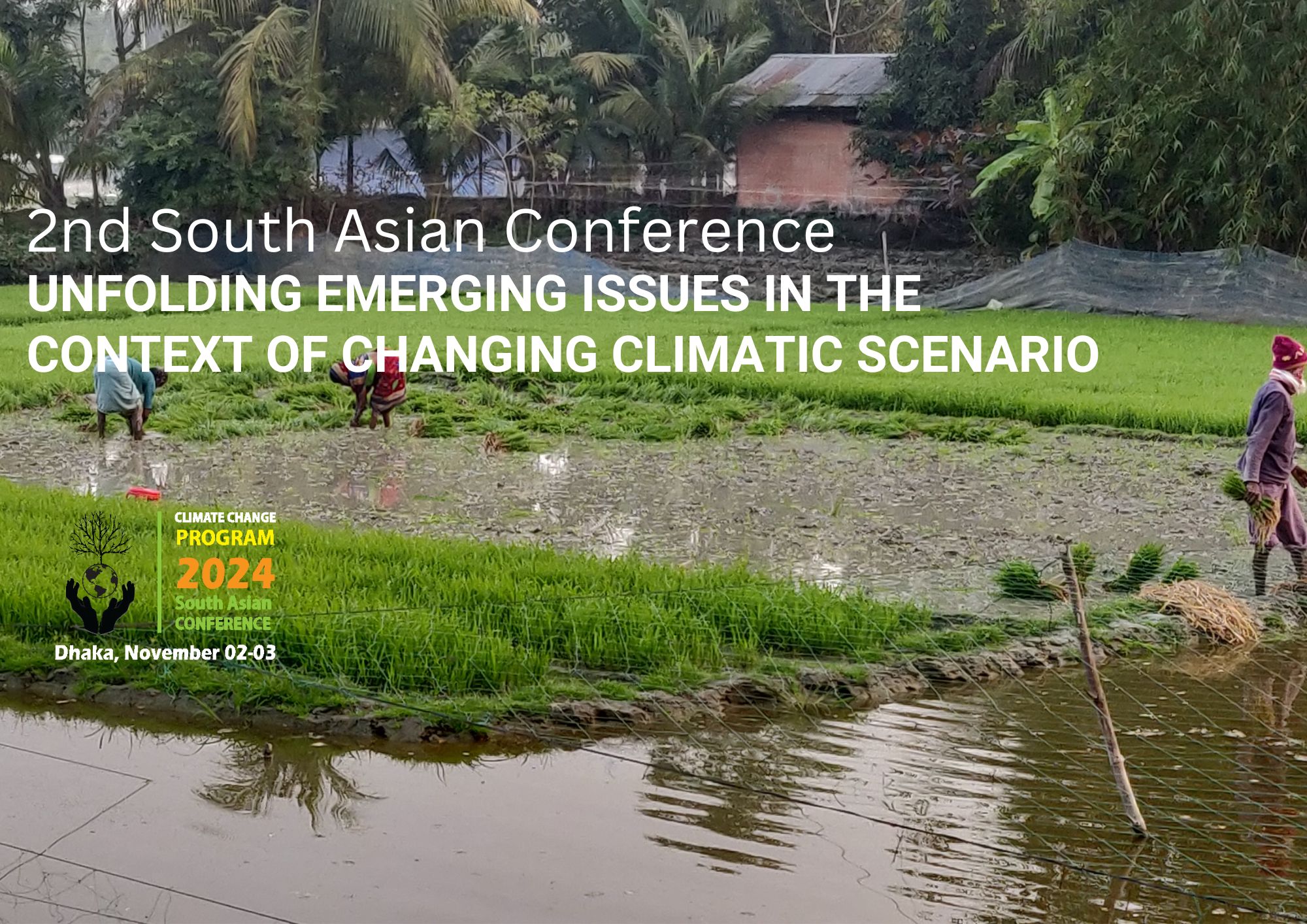2nd South Asian Conference Speakers

Conference Speaker
Dr M. Monirul Qader Mirza is currently an Adjunct Professor and Graduate Faculty Member, Department of Physical and Environmental Sciences, University of Toronto Scarborough. He was associated with Working Group II of the Intergovernmental Panel on Climate Change (IPCC) -the winner of the 2007 Nobel Peace Prize and contributed as a Coordinating Lead Author (CLA) and Lead Author to its various assessments. Apart from the IPCC Assessments, he also participated as a CLA in the Millennium Ecosystem Assessment and the Integrated Assessment of Agriculture, Science, Technology for Development (IAASTD) commissioned by the World Bank. His major research interests are natural hazards science, climate change science, adaptation and risks, quantification of vulnerability and adaptation.
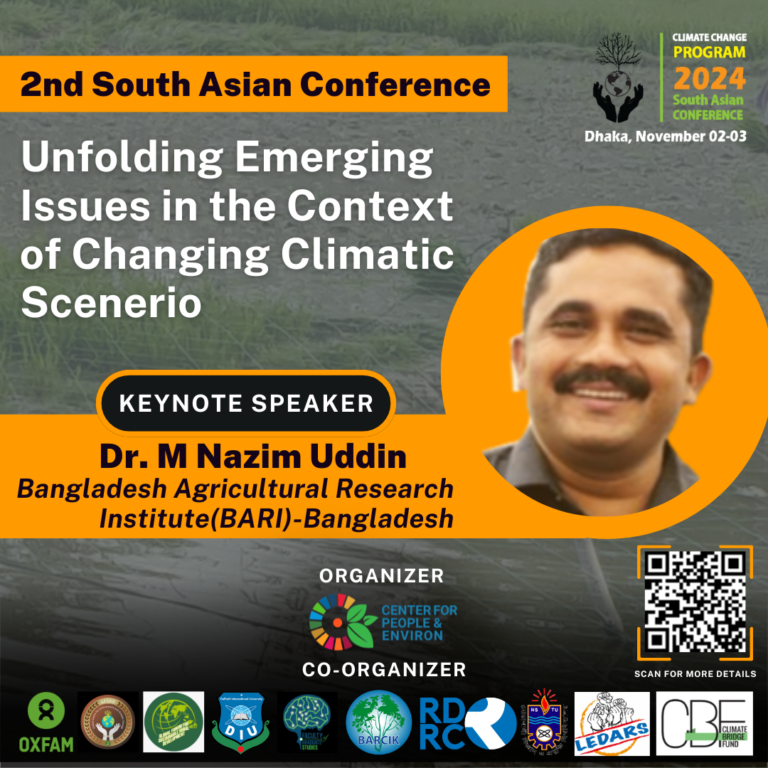
Keynote Speaker
Dr. M Nazim Uddin is a leading figure in horticulture and organic farming, holding a senior position at the Horticulture Research Center of the Bangladesh Agricultural Research Institute (BARI). He has a strong academic background, including a PhD in Horticulture. With over 25 years of experience, he has made significant contributions to agriculture, both nationally and internationally. Dr. Nazim has conducted research in Japan and participated in workshops across various countries, gaining expertise in organic farming and related areas. He has authored numerous publications and plays leadership roles in organizations promoting organic agriculture. Dr. Nazim leads initiatives for climate-smart agriculture, demonstrating his commitment to sustainable practices and environmental conservation.
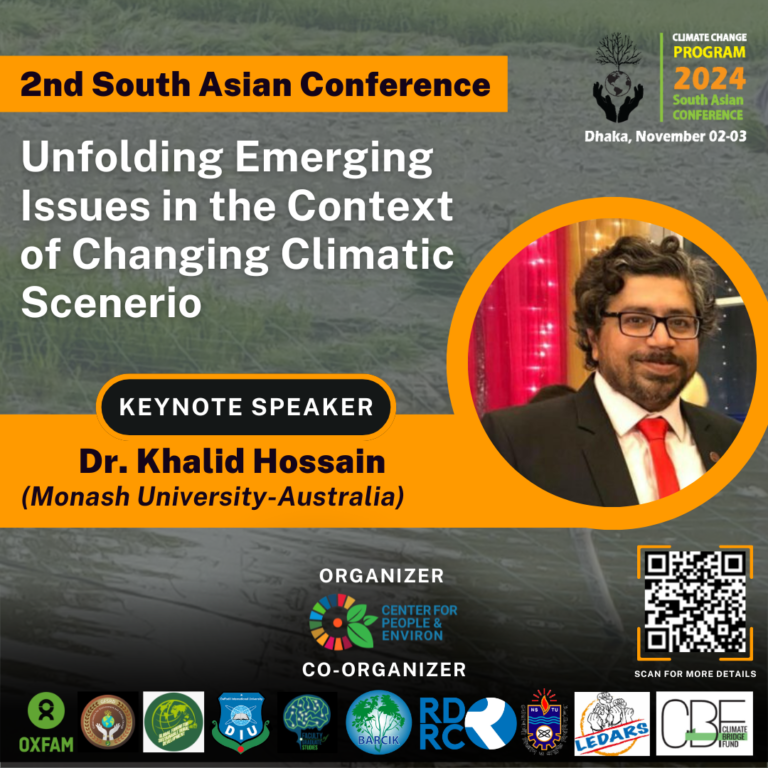
Keynote Speaker
Dr. Khalid Hossain is a Research Fellow at Monash University’s Department of Human Centred Computing, focusing on community and environmental informatics. He leads research on digital citizenship for disadvantaged communities in Bangladesh under the PROTIC2 project. With a PhD in Management from RMIT University, Khalid brings over eighteen years of experience in roles such as Programme Coordinator at IUCN Bangladesh and Economic Justice and Resilience Programme Manager at Oxfam. His extensive background includes research, policy analysis, and grassroots development programming, reflecting interests in climate change, sustainability, governance, and ICT for development.
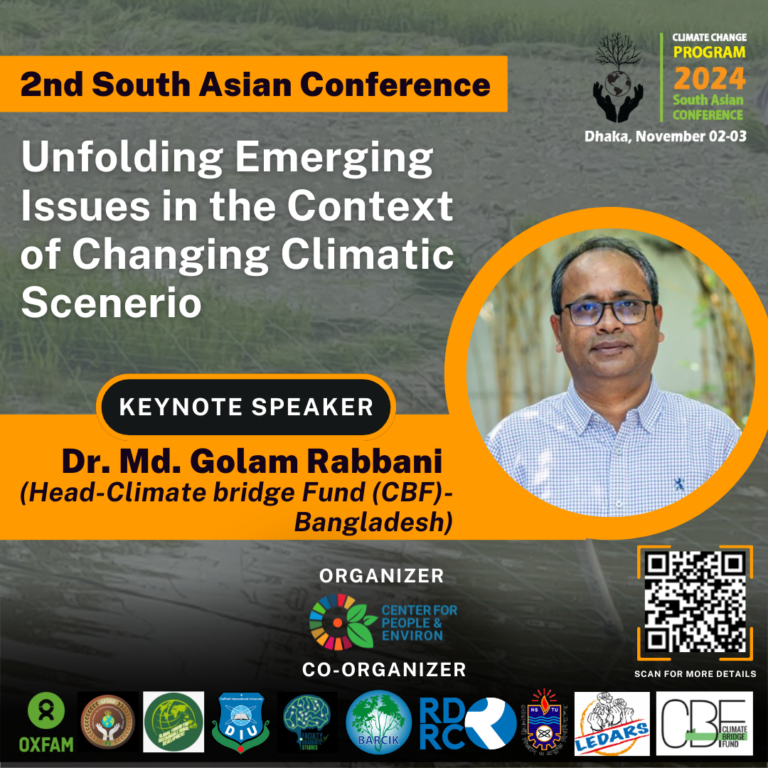
Keynote Speaker
Dr. Md. Golam Rabbani is the Head of the Climate Bridge Fund Secretariat at BRAC in Dhaka, Bangladesh, with over twenty years of expertise in climate risk, vulnerability assessment, and policy development. He has been instrumental in creating key national policy documents for Bangladesh and contributes to global climate discourse through UNFCCC negotiations. Dr. Rabbani is a founding member of the Asia Climate Change Consortium and a Board Member of Climate Action Network South Asia, with numerous contributions to scientific publications.
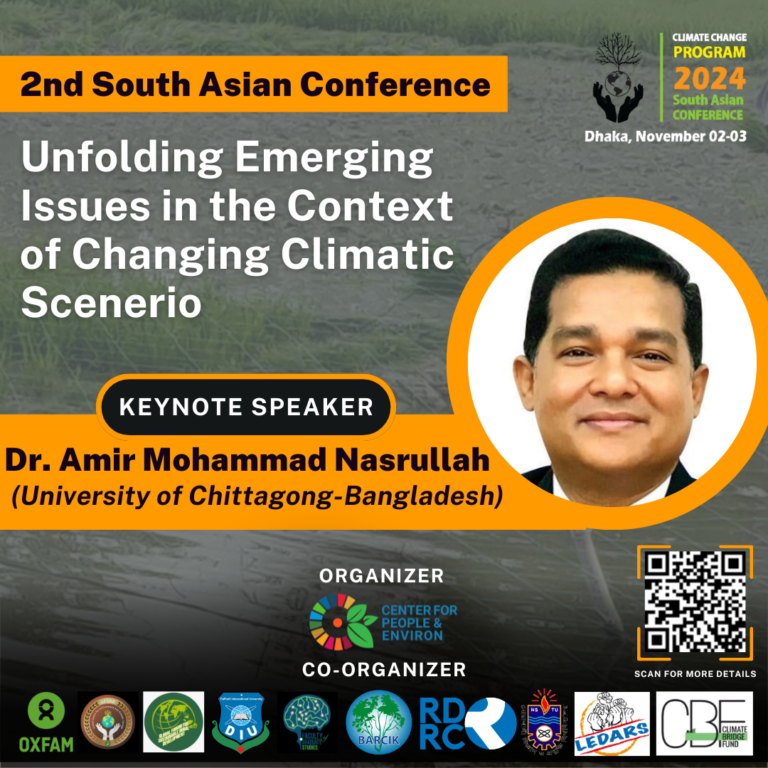
Keynote Speaker
Amir Mohammad Nasrullah, a renowned governance and public administration scholar in Bangladesh, is a Professor of Public Administration at the University of Chittagong. His research areas include governance, public administration, rural development, environmental management, etc. He has many academic contributions including six books. He has collaborated on many research projects with OPRI, Japan. He is associated with many research organizations both at home and abroad.
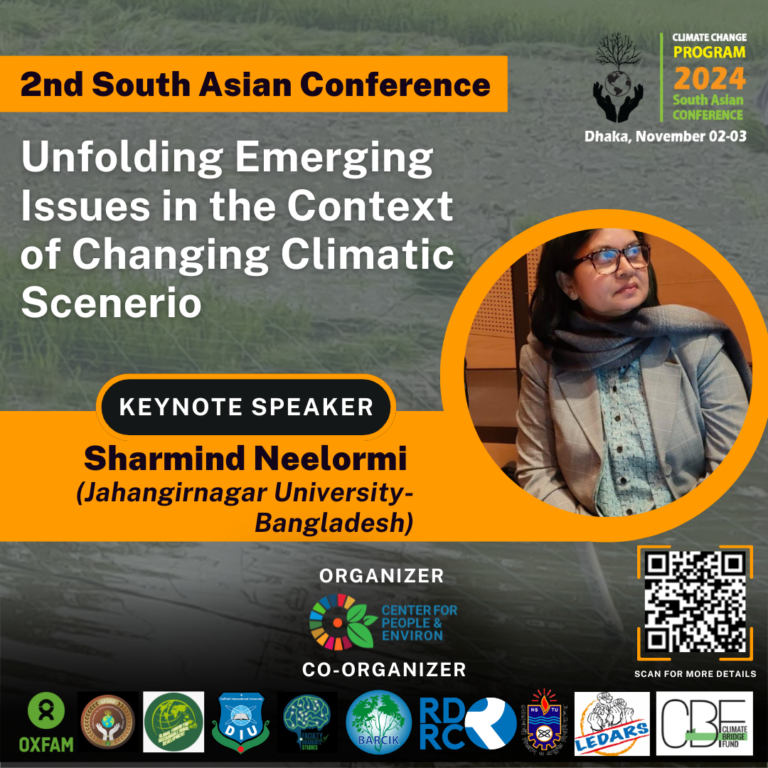
Keynote Speaker
Sharmind Neelormi is a leading expert on climate and gender justice in Bangladesh. Her areas of expertise include climate adaptation, with a particular focus on community-based activities, disaster risk reduction and the gender aspects of adaptation and mitigation. She is a member of the Steering Committee of GenderCC–Women for Climate Change. She is a professor of economics at Jahangirnagar University and a leading expert on climate and gender justice in Bangladesh.
.
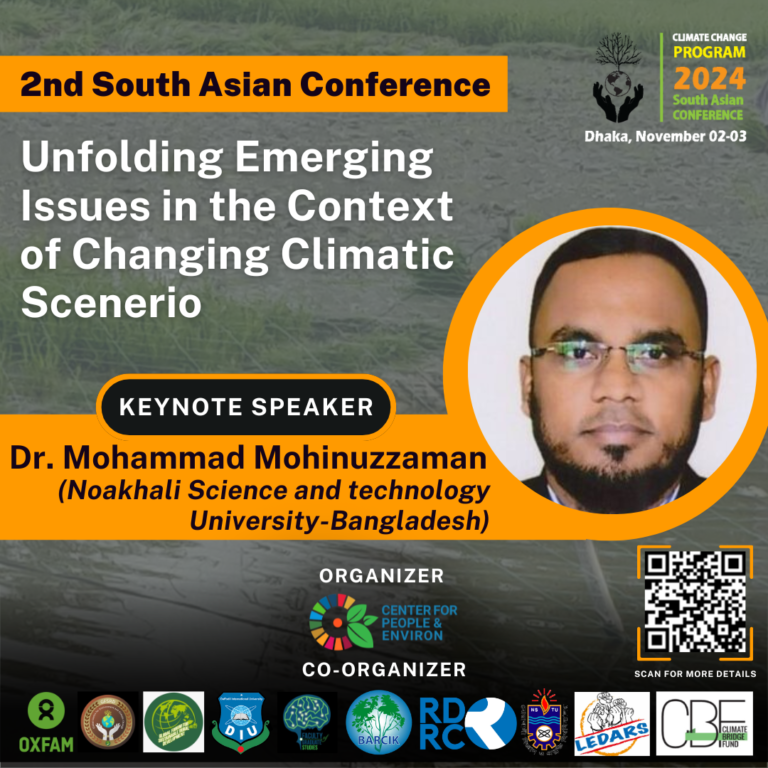
Keynote Speaker
Professor Dr. Mohammad Mohinuzzaman is Chairman of the Department of Environmental Science and Disaster Management, at Noakhali Science and Technology University, Bangladesh. Dr. Mohinuzzaman possesses expertise in climate change and coastal salinity intrusion, seawater intrusion and metals mobility, seawater intrusion and nutrients mobility, and planetary health. His interest goes to biodiversity and food security nexus, halting desertification and drought.
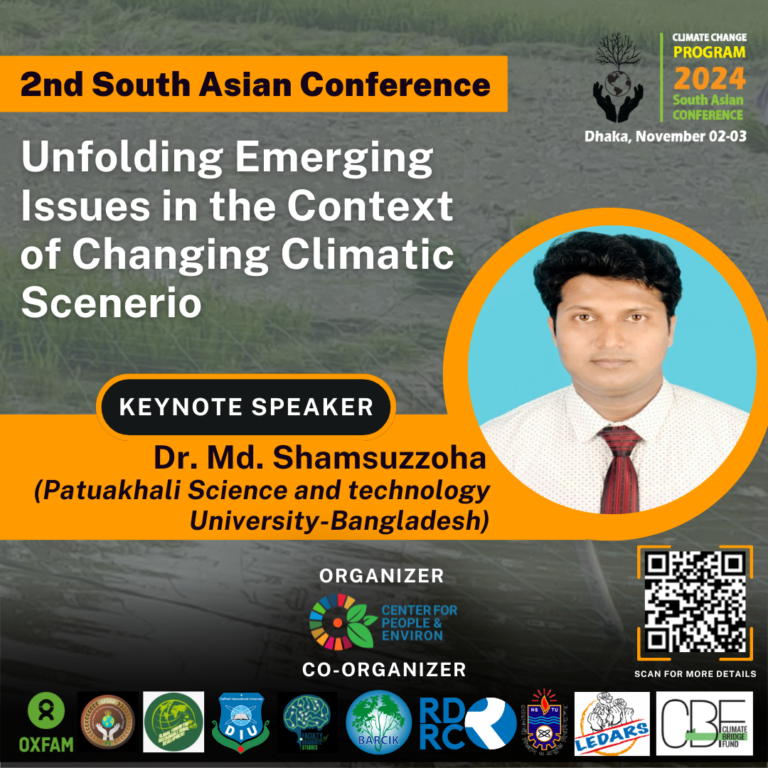
Keynote Speaker
Dr. Md Shamsuzzoha Chairman of the Department of Emergency Management at Patuakhali Science and Technology University, Bangladesh, has been with the university since 2010. He earned his Ph.D. in Bioresource Engineering from the University of Tsukuba with a Bangabandhu Science and Technology Fellowship and holds degrees from the University of Rajshahi. An alumnus of the University of Twente, he has participated in international academic events and conferences across Asia, Europe, and beyond.
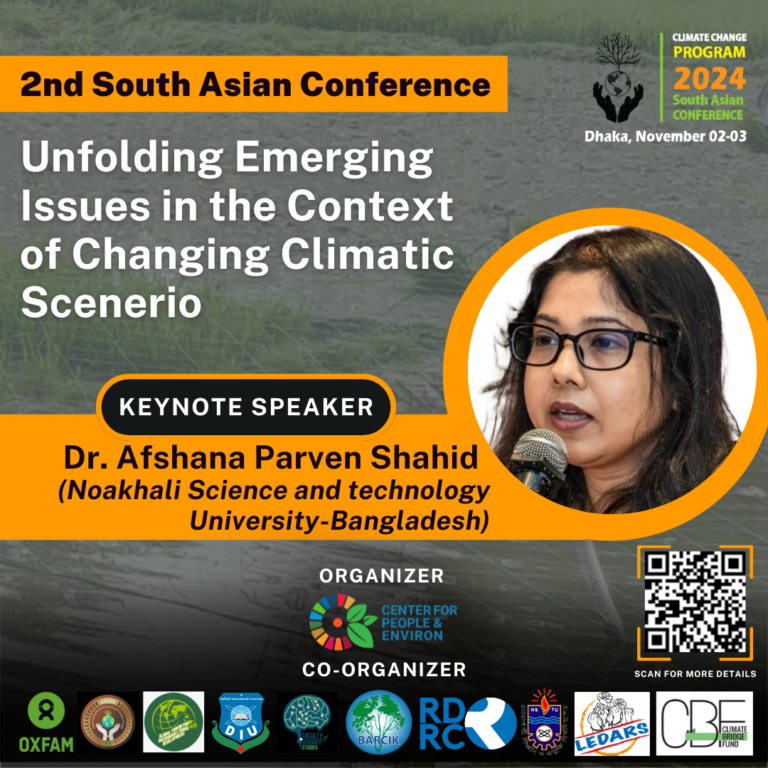
Keynote Speaker
Dr. Afshana Parven Shahid, an assistant professor at Noakhali Science and Technology University, Bangladesh, specializes in climate change, fisheries, and aquaculture. Her research includes climate adaptation, food security, and gender justice. She holds a Ph.D. from the Asian Institute of Technology and two MSc degrees from Wageningen University and AIT. Dr. Shahid is active in the World Aquaculture Society and the GNDR community, and has a robust publication and conference record.
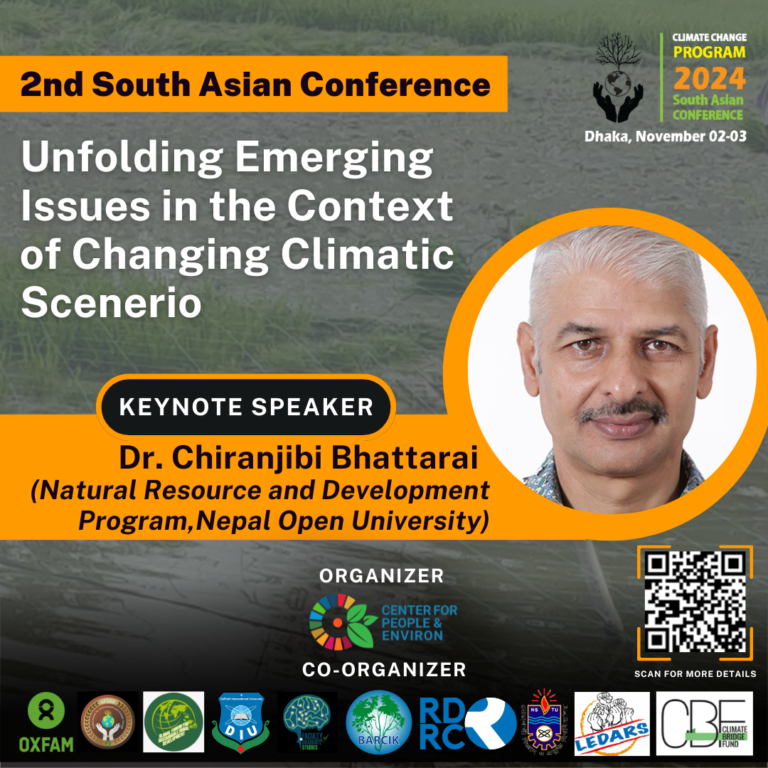
Keynote Speaker
Dr. Chiranjibi Bhattarai, with a Ph.D. in environmental and social justice, is a seasoned researcher, educator, and advocate with 30 years of expertise in law, policy, and development. He focuses on climate change, environmental degradation, and social justice, actively supporting public interest litigations and environmental protection in Nepal. Currently, he leads a project on sustainable riverbed material extraction, teaches at Nepal Open University, and holds several honorary positions, including Vice-Chair of the International Water Association Nepal chapter and Chairperson of the Global Peace Foundation Nepal. Dr. Bhattarai is also a prolific author and contributor to numerous publications.
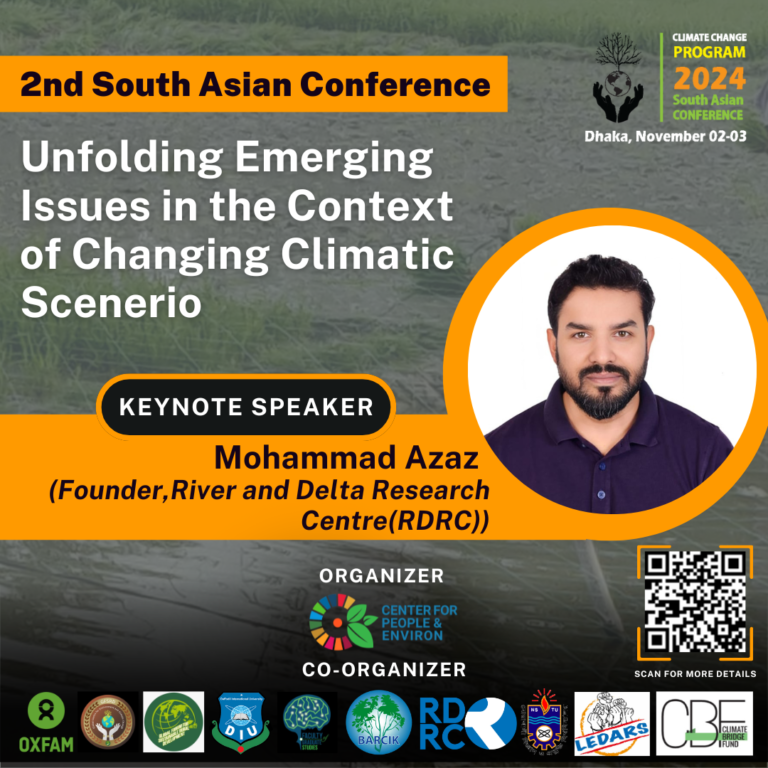
Keynote Speaker
Mohammad Azaz is a researcher, thinker, and activist with over 20 years of experience in local governance, urbanization, and water management, particularly river conservation. Holding an MBA and a postgraduate degree in Development Studies, he has taught at the university level before focusing on environmental activism. As director of “Riverine People” and founder of the “River and Delta Research Centre,” Azaz leads efforts in river conservation, grassroots activism, and transboundary water issues. His notable initiatives include projects like “Dhaka Rivers” and “Re-wet” for urban watercourse restoration. Azaz also serves as co-vice president of the GBM Basin Peoples’ Network, editor of the journal “Obobhahika,” and hosts a talk show on environmental issues.

Keynote Speaker
Md. Zahangir Alam coordinates BARCIK’s climate change and adaptation program, overseeing staff, planning, and field implementation. He also contributed to the Hoar Agro biodiversity project and various publications. With BARCIK since 2006, he has attended international climate events and previously taught in Dhaka. He holds an M.Sc and B.Sc in Geography from the University of Dhaka.
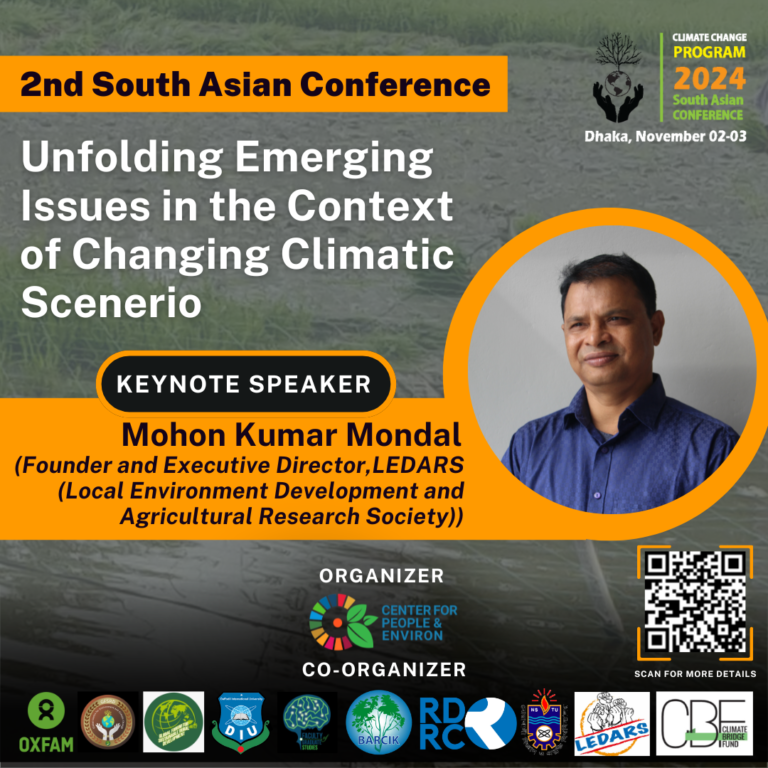
Keynote Speaker
Mohon Kumar Mondal is the Founder and Executive Director of LEDARS (Local Environment Development and Agricultural Research Society), an environmental NGO. He holds a postgraduate degree in Geography and has completed a short course on Disaster Management and Humanitarian Response from BIARI, Brown University, Rhode Island, USA. Mondal founded LEDARS in 1996, at the start of his career, in response to the emerging climate challenges faced by coastal communities in Bangladesh. He has participated in numerous international forums, including COPs, to raise awareness about the vulnerabilities of these communities. In 2012, he was part of the U.S. State Department’s IVLP program. Under his leadership, LEDARS has received several prestigious national and international awards, such as the Channel I Standard Chartered AGROW Award and the Zayed Sustainability Prize.
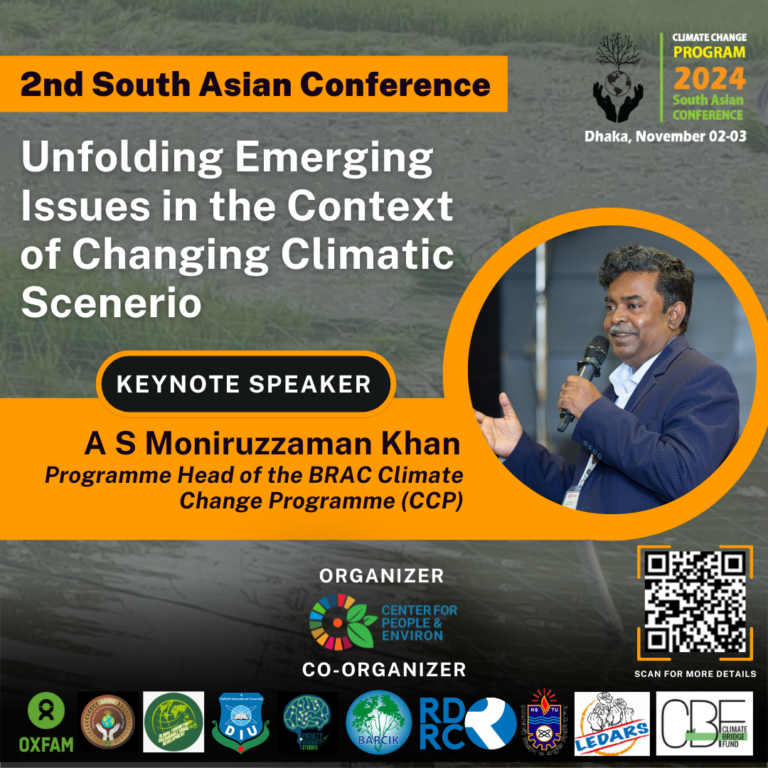
Keynote Speaker
A S Moniruzzaman Khan is the Programme Head of the BRAC Climate Change Programme (CCP), where he leverages extensive expertise in climate change adaptation and natural resource management. With a strong academic background and a history of impactful work, he develops strategies addressing various climate-related issues, including agriculture, food security, and energy efficiency.
Notably, he leads the “Adaptation Clinic,” which provides agricultural services to enhance resilience among vulnerable farmers using regenerative practices. Additionally, he oversees a project in Mongla Upzila to implement rainwater harvesting systems, combating salinity intrusion and water scarcity. Khan’s leadership exemplifies a practical approach to sustainability and community resilience, contributing significantly to global climate change initiatives.
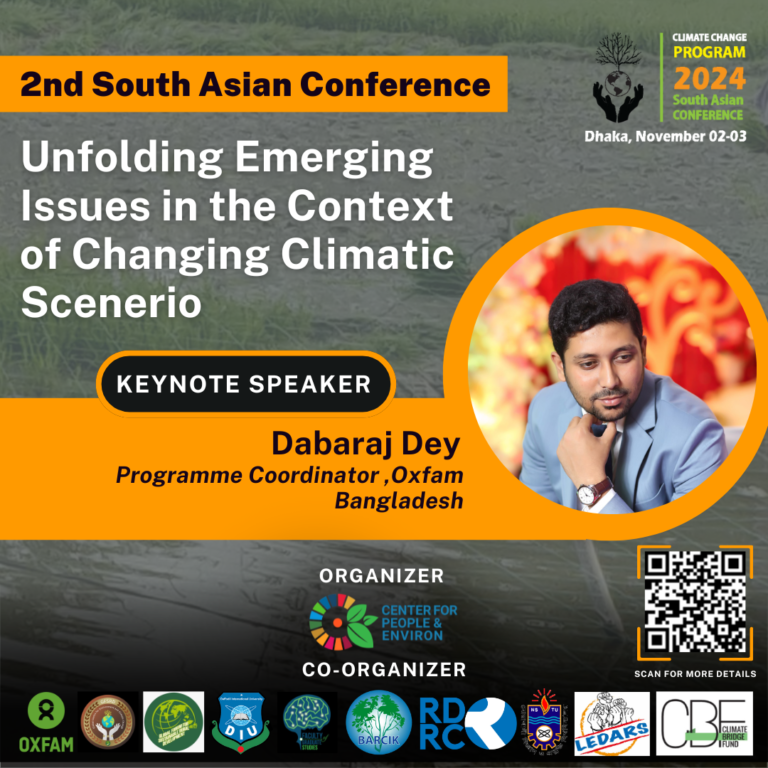
Keynote Speaker
Engr. Dabaraj Dey is the Programme Coordinator at Oxfam in Bangladesh, specializing in sustainable development with a feminist lens. With over nine years of experience in areas like Environment & Climate Justice, Humanitarian Response, and Community Resilience, he has successfully led multi-country programs funded by organizations such as ADB and Australian Aid. Under his leadership, Oxfam received the Urban Climate Resilience Award in 2018 and 2019. Dabaraj’s expertise includes project management and community initiatives focused on climate adaptation, and he holds advanced degrees in Disaster Management and Environmental Science, along with a B.Sc. in Civil Engineering. He is actively involved in the Feminist Climate Movement, advocating for gender equality and inclusivity in climate resilience efforts.
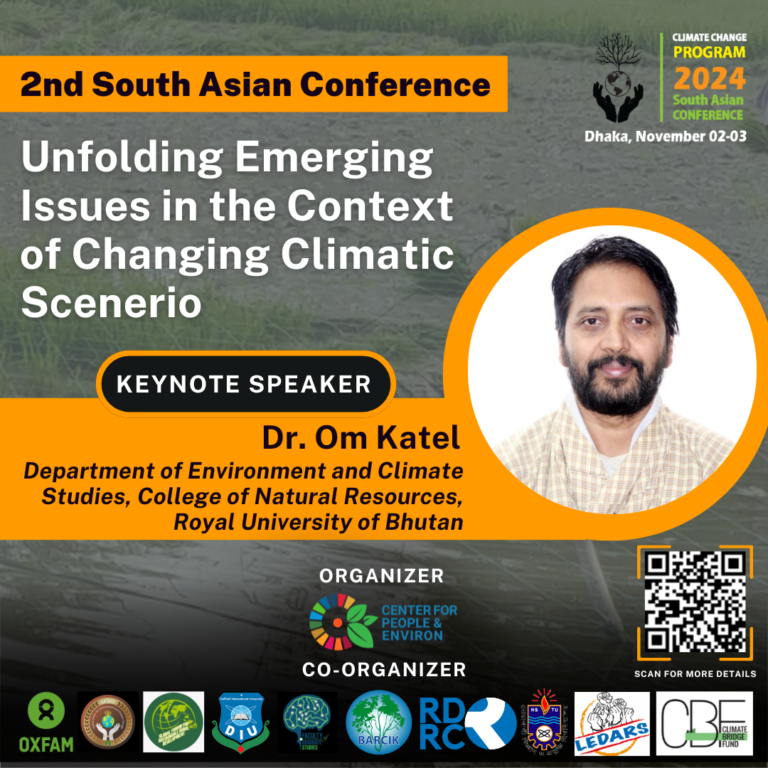
Keynote Speaker
Dr. Om Katel is a wildlife biologist and environmentalist who teaches at the Department of Environment and Clinate Studies, College of Natural Resources, Royal University of Bhutan. He has a PhD degree in Natural Resources Management from the Asian Institute of Technology, Thailand and completed post-doctoral research at Nagoya University, Japan. His research interests include hydrology, water resources management, integrated watershed management, climate change, ecosystem services, land management, food security, and biodiversity conservation . He is also a National Geographic Explorer who received a grant in 2021 to explore the invertebrate diversity of the last virgin rivers of Bhutan.
He is also the Head of the Global Forum for Sustainable Rural Development-Global Centre for Environment and Climate Change, a research center that aims to provide solutions for environmental and climate challenges in Bhutan and beyond. At the College of Natural Resources, he is leading the PhD in Climate Studies program and also shouldering the resposibility as head of the Centre for Environment and Climate Research an initiative to conduct interdisciplinary research on environmental and climate change.
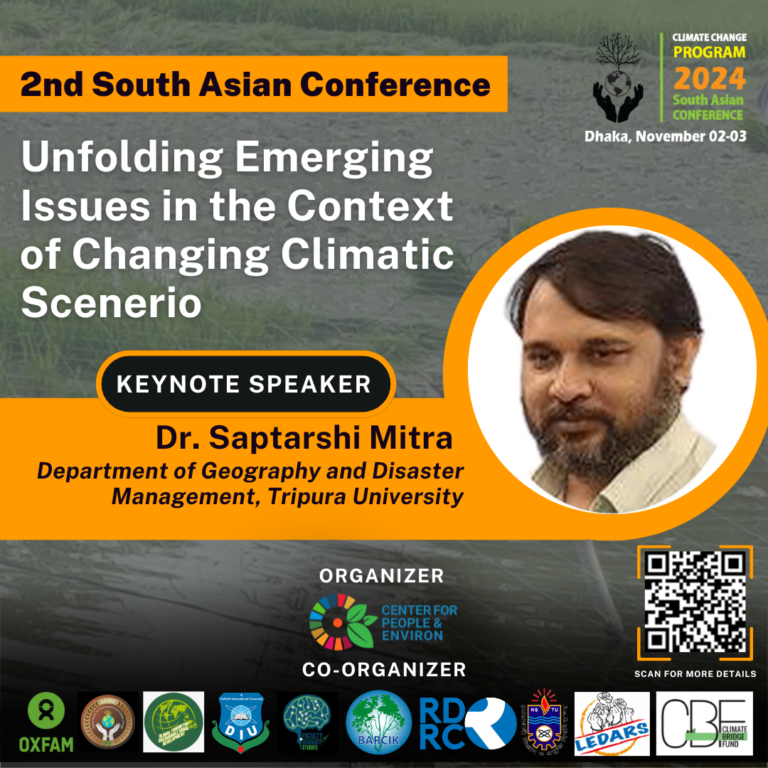
Keynote Speaker
Dr. Saptarshi Mitra serves as an Associate Professor in the Department of Geography and Disaster Management at Tripura University, a Central University of India. He is an accomplished academic and researcher, having contributed numerous publications in national and international journals. Dr. Mitra’s research interests encompass a wide array of topics, including rural and urban planning, transport planning and environmental sustainability. His scholarly works also extend to interdisciplinary areas, often collaborating with leading institutions and organisations. Dr. Mitra holds an M.Sc. and Ph.D. in Geography, specialising in regional planning. His contributions are recognised within the Indian academic community, where he is actively involved in teaching, mentoring and guiding research. Currently, he serves as the editor of the peer-reviewed Indian Journal of Regional Science, further demonstrating his commitment to advancing geographic and regional planning in India and beyond.
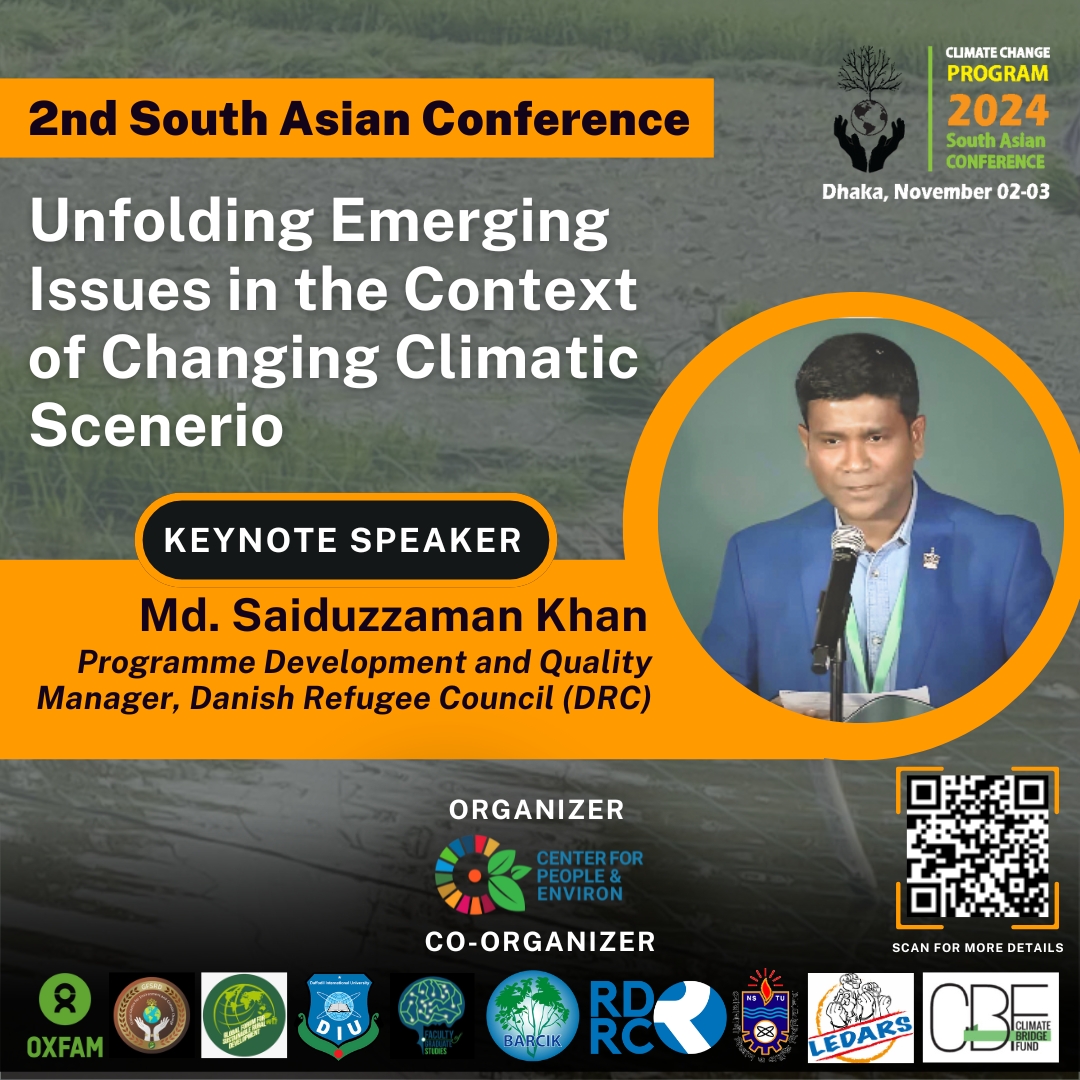
Keynote Speaker
MD. Saiduzzaman Khan is a seasoned humanitarian and development professional specializing in program development, research, monitoring, global networking, and fundraising. With degrees in Public Policy and Disaster Management and training from prestigious institutions like MIT and Johns Hopkins, he has extensive experience in complex development dynamics, including humanitarian response and risk reduction. He has collaborated with organizations such as the World Bank, UN, JICA, and the European Union. Currently, he works with the Danish Refugee Council, overseeing program development and quality, and advocating for sustainable solutions for refugees and host communities in crisis situations.
